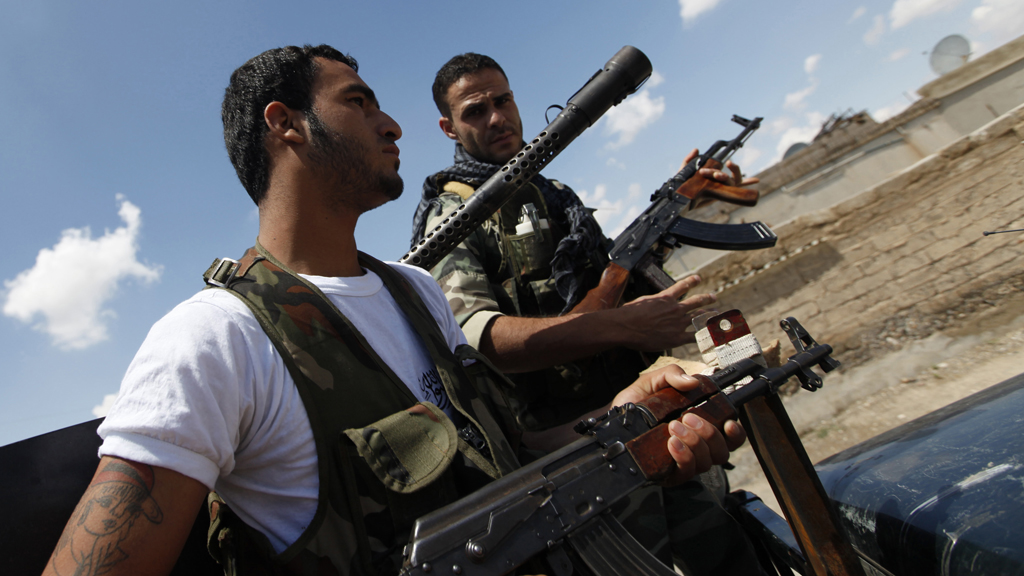Chemical threat hanging over Syria’s republic of fear
With diplomatic moves to end Syria’s conflict locked in paralysis, there is a very real danger the country’s huge chemical weapons stockpile could either be used or fall into the hands of jihadists.

Ten years on from Saddam, the world is confronted by a belligerent regime that really does have WMD. Bashar al-Assad‘s known possession of large stocks of nerve gas is now un-nerving the region.
And inside Assad’s crumbling republic of fear, disturbing indications that chemical weapons have already been used. A game-changer, says Barack Obama.
But haunted by ghosts of Iraq, the west is this time resisting armed intervention. There are no good options. The outlook is bleak.
According to intelligence, there are hundreds of tons of chemical weapons or agents in Syria, which is a huge stockpile. Brig Gen Michael Herzog
“According to intelligence assessments there are hundreds of tons of chemical weapons or chemical agents in Syria, maybe a thousand tons, which is a huge stockpile, one of the biggest in the world,” Brigadier General Michael Herzog, former chief of staff with the Israeli defence force, told Channel 4 News.
He says the stockpile includes Sarin, which affects the nervous system, and VX, which affects the victim through breathing and also through the skin, as well as mustard gas and other chemical agents.
Weaponising nerve agents
Earlier this month, an Israeli airstrike hit the Jamraya military complex near Damascus, ostensibly targeting a shipment of Iranian missiles which Israel feared may have been bound for the Hezbollah Shia militia in Lebanon.
But the secret Jamraya facility contained more than just missiles. It was a scientific research centre, working on the weaponisation of nerve agents.
Large chemicals storage facilities are dotted across Syria. Warehouse 417 lies north east of Damascus; 418 is east of Homs. And there is another big depot at Hama.
Then come the production facilities. The biggest plant in the entire Middle East is at As-Safirah, a village 15 miles south east of Aleppo.
‘Mass casualties’
Brigadier General Adnan Salou is among the highest-ranking Syrian defectors to date. He is now with the rebel Free Syrian Army. But in his past life “Chemical Adnan” was in regular contact with President Assad and ran his chemical warfare unit for five years, up to 2008.
The former chief of staff of Syria’s Chemical Warfare Authority told Channel 4 News: “If the regime senses that its appointed time is nigh and it is encircled, then it will use these gases in large quantities. Yes – VX, Sarin and mustard gas.”
It is widely believed that the tonnage of Bashar al-Assad’s chemical stockpile far exceeds what Saddan Hussein once had.
Mustard gas is what Saddam Hussein used to kill Kurds in Halabja. It is widely believed that the tonnage of Bashar al-Assad’s chemical stockpile far exceeds what Saddam once had.
“We saw in Halabja in 1988, 5,000 people killed in under an hour. 12,000 dead in a bombardment that, in effect, lasted an hour, maybe two hours,” Hamish de Bretton-Gordon, former commander at the UK’s Porton Down chemical weapons unit, told Channel 4 News.
“He (Assad) does have the potential to create mass casualties on an industrial scale.”
Jihadist threat
Layered on top of fears that Assad might use chemical warheads is the dark, lurking threat that jihadi groups could get their hands on them.
The huge As-Safirah chemical plant is described as a vast complex inside this mountain, secured by 4,000 troops. But for three months now, it has been under siege from the al-Qaeda affiliated al-Nusra Front and other jihadi brigades.
Turkish military analyst Professor Mesut Casin warns of the danger should such groups get hold chemical weapons.
The most feared event in modern terrorism is for uncontrollable small groups to gain possession of weapons of mass destruction. Prof Mesut Casin
“The most feared event in modern terrorism is for uncontrollable small groups to gain possession of weapons of mass destruction. This can happen. We have seen it,” he says.
“Chemical weapons were used in Japan in the Tokyo attack and the international community saw how effective they were.”
Among the Syrian opposition, based in Istanbul, all these grim scenarios are being considered very seriously, as Syria’s civil war becomes ever more deadly, ever more complex.
Not many options
The question of how to prevent chemical conflagration has become a matter of urgent debate now. The US, Europe, Israel and Turkey have all been drawing red lines across which, they say, Assad must not step. All involve the deployment, transfer or capture of chemical weapons.
Nor are there many options. Intervention aimed at securing the stockpiles would, the Americans say, need 75,000 troops. And that is an invasion. Western airstrikes on storage bunkers would carry a high risk of toxic gas clouds.
“What you can do right now,” says Brigadier General Herzog, “is either deter the Syrian military from using, which the US is trying to do, or train some non-Islamist, non-jihadi rebel forces in how to control the chemical agents and chemical weapons, with the hope that once the regime falls these weapons will not fall into the wrong hands.”
‘Kill anyone who attacks’
American forces are already training rebel soldiers in how to secure storage sites. FSA units near chemical bunkers take orders from Brigadier General Salou, who once headed Syria’s Chemical Warfare Authority.
“I gave orders to the commanders of battalions near to the warehouses that in the event of regime collapse, or someone from outside trying to intervene, like from the Nusrah Front, you are to protect them,” he says.
“Don’t let anyone get into them. Kill anyone who attacks them.”
So that is the plan as it stands. Diplomatic paralysis, red lines blurred, fingers crossed – as Syria lies dying and its dictator-president weighs up his options.




